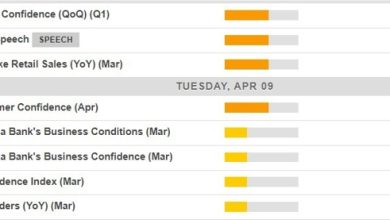Fed Chief Powell said officials would not wait for inflation to hit 2% to cut rates
Gabriela Santos, chief market strategist at JPMorgan Asset Management, analyzes the Federal Reserve’s decision-making on “The Claman Countdown.”
Chairman of the Federal Reserve Jerome Powell said Monday that policymakers would not wait for inflation to fall to 2% to cut interest rates.
“That implies that if you wait for inflation to come down to 2%, you’ve probably waited too long, because the tightening that you do, or the level of tightening that you do, still has effects that are likely to push inflation down below 2%,” Powell told the Economic Club of Washington DC.
The Fed chief reiterated that policymakers are looking for further evidence that high inflation is under control before turning to cutting rates.
“We want to have more confidence that inflation is moving sustainably toward our 2% target,” he said. “What increases that is more reliable inflation data. And recently we’ve had some of that.”
FED’S POWELL CONDEMNS TRUMP ASSASSINATION ATTEMPT: ‘A SAD DAY FOR OUR COUNTRY’
The Marriner S. Eccles Federal Reserve Board Building is seen on September 19, 2022 in Washington, DC. ((Photo by Kevin Dietsch/Getty Images) / Getty Images)
Officials voted At their last meeting in May, Fed officials decided to keep interest rates at a range of 5.25% to 5.5%, the highest level since 2001. Although policymakers left the door open to rate cuts later this year in their post-meeting statement, they also stressed the need for “greater confidence” that inflation is falling before easing policy.
Since then, there have been signs that inflation is starting to slow again. The May personal consumption expenditures index showed inflation fell to 2.6%, from a peak of 7.1%. At the same time, core prices—which are more closely watched by the Fed because they exclude volatile measures like food and energy—also rose 2.6%, the slowest annual rate since March 2021.
WHY CAN’T YOU FIND A HOUSE FOR SALE?
Most investors now expect the Fed to start cutting rates in September or November and are looking at just two this year — a sharp shift from earlier this year, when they anticipated six rate cuts as early as March.
Federal Reserve Chairman Jerome Powell attends a news conference in Washington, DC, on May 1, 2024. (Photo by Liu Jie/Xinhua via Getty Images/Getty Images)
Powell did little Monday to counter those expectations. He also said he thought a hard landing scenario was unlikely.
GET FOX BUSINESS ON THE GO BY CLICKING HERE
Higher interest rates tend to create higher rates on consumer and business loans, which then slow the economy by forcing employers to cut back on spending. Rising rates have helped push the average 30-year mortgage rate above 8% for the first time in decades. Borrowing costs for everything from home equity lines of credit to auto loans to credit cards have also skyrocketed.
News Source : www.foxbusiness.com
Gn bussni


